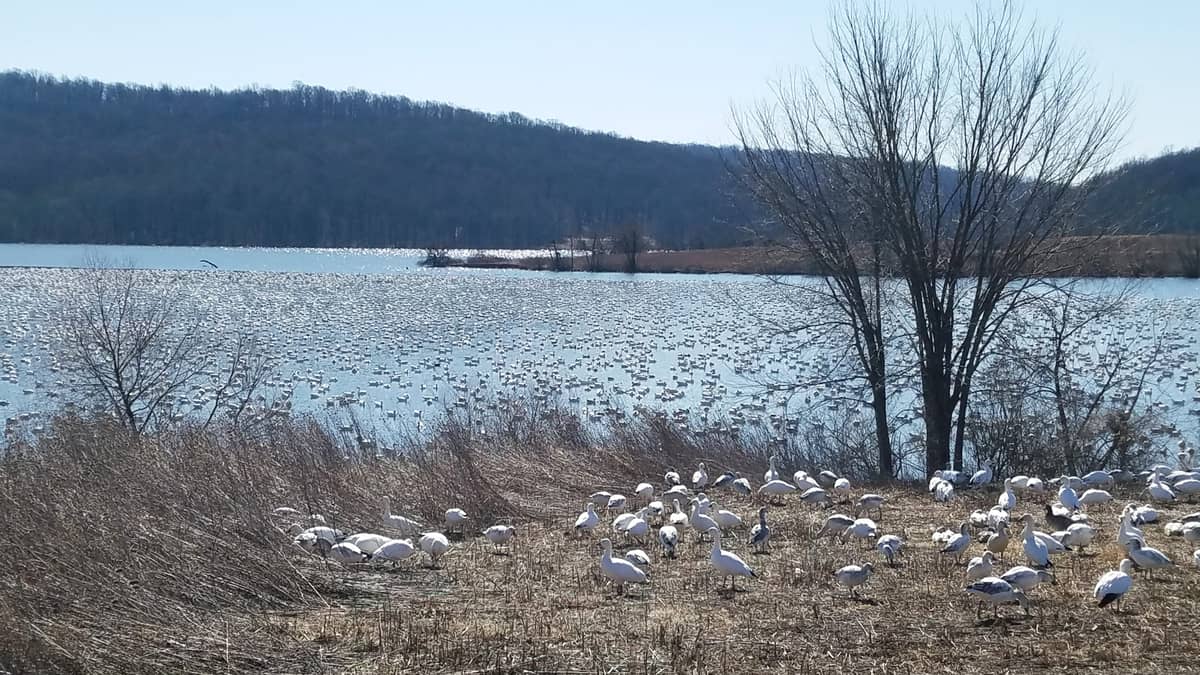It’s that time of year: tens of thousands of snow geese migrating north for the warm months are once again stopping over at the Middle Creek Wildlife Management Area in southeast Lebanon County.
The annual migration of the greater snow geese subspecies, which spend their summers at their breeding grounds in the Arctic, passes along the Atlantic coast and through the eastern United States. The 6,254-acre Pennsylvania Game Commission property, which also spreads into Lancaster County, makes for a convenient resting point along the way.
For the last several years, the peak numbers of snow geese on the lake have been estimated at higher than 100,000.
The latest update posted by Middle Creek staff places the current number of geese on the central 400-acre lake at roughly 65,000. Generally, barring unusual weather patterns and other factors, the peak comes between mid-February and mid-March.
Human visitors to the wildlife area also tend to spike in this period. While Middle Creek has a number of hiking trails and pull-over points near the lake, the Willow Point Trail along Hopeland Road is typically a highly popular among sightseers. If you plan to visit, be aware that the one-mile trail has limited parking.
The Visitors Center at 100 Museum Road reopened for the year at the start of February. The tour road around the lake, however, is still closed until March 1. The center’s hours run from Tuesday through Saturday from 8 a.m. to 4 p.m. and Sunday from noon to 5 p.m.
Staff recommend visiting at dawn or sundown, when the geese are roosting on the lake, for the best chances of seeing the largest flocks on the water. A webcam provides a live feed of the lake.
To those visiting, be aware that the United States is experiencing an outbreak of avian flu, and that any wild birds at Middle Creek may carry it. While the transmission risk to humans is relatively low, those who handle or work with birds in their careers or personal lives are advised to be particularly cautious.
In addition to the snow geese, tundra swans and Canadian geese also use Middle Creek as a temporary feeding ground on their migrations. The area is recognized as a Globally Important Bird Area by BirdLife International and the National Audubon Society, one of only six in the state.
Read More: [Photo Story] Quiet beauty and still waters at Middle Creek
Questions about this story? Suggestions for a future LebTown article? Reach our newsroom using this contact form and we’ll do our best to get back to you.

Support Lebanon County journalism.
Cancel anytime.
Monthly Subscription
🌟 Annual Subscription
- Still no paywall!
- Fewer ads
- Exclusive events and emails
- All monthly benefits
- Most popular option
- Make a bigger impact
Already a member? Log in here to hide these messages
While other local news outlets are shrinking, LebTown is growing. Help us continue expanding our coverage of Lebanon County with a monthly or annual membership, or support our work with a one-time contribution. Every dollar goes directly toward local reporting. Cancel anytime.
























